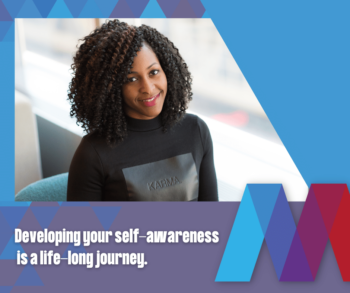What makes someone self-aware?
Leaders need a lot of self-awareness to be successful these days.
But have you ever wondered exactly what makes someone self-aware?
Let’s start by defining self-awareness.
My clients who most effectively demonstrate this trait are very conscious of how their actions, thoughts, and behaviors impact themselves and the people around them.
➡️ They can pivot or change course when they recognize that their approach isn’t working.
➡️ They can stay calm under pressure.
➡️ They don’t spiral into an emotionally driven reaction to any situation.
Over the years, I have coached many leaders who lack self-awareness, and to be honest, it really impedes their ability to be successful.
In fact, a recent Harvard Business Review study interviewed 5000 leaders and found, “Even though most people believe they are self-aware, self-awareness is a truly rare quality: We estimate that only 10%–15% of the people we studied actually fit the criteria.”
Yet, the good news is that you can develop self-awareness over time.
I often work with people who have no idea how their actions impact the people around them. Over time, these leaders learn to pause, make better choices about their behavior and greatly improve their relationships AND results.
 Developing your self-awareness is not a one-time goal. Rather, it’s a life-long journey.
Developing your self-awareness is not a one-time goal. Rather, it’s a life-long journey.
So, where can you start?
Here are 3 things you can do to be more self-aware right now:
- Learn from your mistakes. We all make mistakes because we are human. But I see so many leaders make the same mistakes over and over again. To develop your self-awareness, be analytical when you make a mistake. Review your behavior. Think about what caused the mishap. Most importantly, think about what you need to do differently next time to be more effective.
- Get feedback from a few trusted colleagues. Don’t assume that you are self-aware. Many people think they know themselves well, but they actually have blind spots. Seek honest feedback from a few trusted colleagues. Each person you ask will have a slightly different perspective based on their own biases. So, when you ask a few people for feedback, you will be able to identify one or two key areas that you need to develop.
- Understand how you get in your own way. So many leaders that I work with self-sabotage. For example, they behave in ways that escalate conflict in their relationships. If you notice a reoccurring issue in your relationships, I promise you it’s not other people causing this issue. It’s you! You are the common denominator in all of these relationships. Think about what you might be doing to ruffle feathers. Maybe you are too task-oriented, overly aggressive, or way too passive about asking for your needs to be met.
Self-awareness is crucial for leaders.
After all, self-aware people are happier, have better relationships, and communicate more effectively.
Commit to constantly be learning, growing, and improving yourself.
This commitment will not only make you a better leader and improve your team’s performance, but it will make you a better person overall!
You are worth it!
If you’d like a few more practical strategies to develop your self-awareness, take a minute to download my free guidebook.


